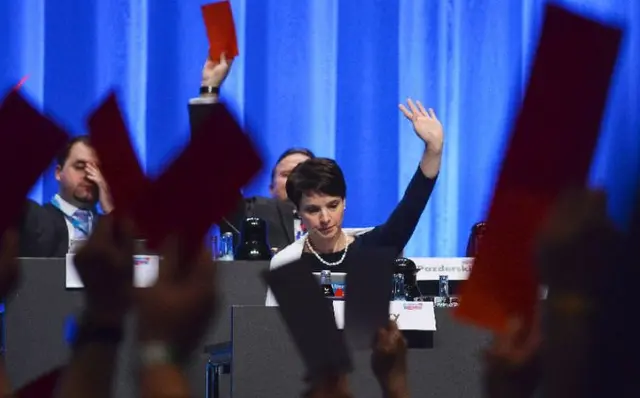German politicians and religious communities across Germany responded on Monday with fierce criticism to the hard-right manifesto adopted by Germany's right-wing Alternative for Germany (AfD) party.
The AfD set up its first formal election manifesto at a national party conference on Sunday, on the back of major gains in regional elections in three German states earlier this year.
"Islam is not part of Germany," reads a line from the AfD policy paper agreed on in a vote by some 2,400 members in the western German city of Stuttgart.
The manifesto also demands a ban on minarets on mosques, the call to prayer, full face veils for women, and headscarves in schools.
More broadly, the AfD has presented itself as a nationalistic-conservative force that also questions climate change, would push traditional family values, reintroduce military conscription and take Germany out of the euro.
Aiman Mazyek, head of Germany's Central Council of Muslims, told media that the AfD's "Islamophobic program" would not help "one jot" to solve problems, but only divide Germany.
Josef Schuster, president of Germany's Central Council of Jews, said resolutions passed at the AfD conference made the party's hostile stance towards religion "crystal clear," adding the party' s anti-Islam policy showed its intolerance and disrespect for religious minorities.
The approved manifesto, Schuster noted, has amounted to an attempt to "split our society and thwart peaceful coexistence," resulting in a departure of the party from the foundations of the German constitution.
Formed only three years ago on a Eurosceptic platform, the AfD has gained strength as the loudest voice protesting German Chancellor Angela Merkel's welcoming of one million asylum seekers last year.
But with the migrant influx sharply down in recent months, the party has shifted focus to the signature issue of the anti-Islam street movement PEGIDA, which stands for Patriotic Europeans Against the Islamisation of the West.
In a "Super Sunday" vote in March, the AfD recorded remarkable gains in regional elections in Germany's southwestern states of Baden-Wuerttemberg and Rhineland-Palatinate as well as eastern Saxony-Anhalt, and was able to break into all three state parliaments.
Having entered half of Germany's 16 state parliaments, the AfD has now firmly set its sights on national elections in 2017.
A survey published Sunday by the pollster Emnid institute showed the AfD polling 13 percent among voters nationwide, making it Germany's third strongest party, just ahead of the ecological Green Party.
Politicians across the established parties in Germany, however, expressed concerns Monday over the AfD's policies and ruled out any cooperation with the party.
Ralf Stegner, deputy chairman of the Social Democratic Party (SPD), described the AfD as a "fractious and confused right-wing party," saying its principle was "to identify scapegoats, but not to present solutions."
Katrin Goering-Eckardt, leader of the Greens' parliamentary group, said the party did not respond to the challenges of modernity and globalization, but rather stuck its head in the sand.
Gerda Hasselfeldt, a leading politician of the Christian Social Union (CSU), accused the AfD of "crude populism."
AfD leader Frauke Petry's dream of being part of a new government in 2017 would fail because "no other democratic party would work with her," Hasselfeldt said. Enditem
 简体中文
简体中文

